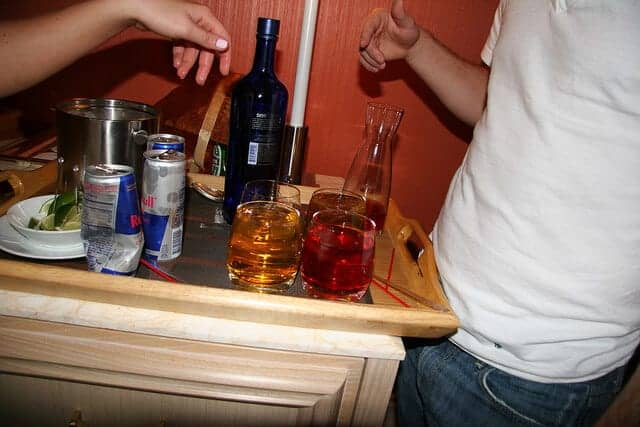If you mix an energy drink with alcohol, you may believe you’re more intoxicated and act more daring than you really are.
That’s what a new study, conducted at INSEAD Sorbonne University in Paris, found when researchers performed energy-drink experiments on 154 young men — that believing you’re consuming an energy-drink-and-alcohol mix makes you act drunker than normal.

Yet in the study, during which researchers had all study participants drink the same mixture but slapped different labels on them, the only change in ingredients was a person’s perceived effects of imbibing energy drinks.
For the study, the researchers had all 154 young men drink a vodka-and-fruit-juice cocktail, but they labeled the drinks differently for the three groups of men they studied. One group’s label, for instance, was “Red Bull & vodka,” while the others were simply “vodka cocktail” or “fruit juice cocktail.”
After the study participants consumed the drink, the researchers asked questions about their behavior, such as their willingness to talk to women, and instructed them through a gambling game to assess their levels of risk-taking.
Related: Mixing Alcohol and Energy Drinks Is a Recipe for Injuries, Study Says
Ultimately, the researchers found that “the effect of the label alone on participants’ self-assessment of intoxication was remarkable.”
Perceived levels of intoxication increased by 51 percent among those whose label listed the energy drink, and those misled energy-drink imbibers also were more likely to chat with women and show high levels of risk-taking.

“Red Bull has long used the slogan ‘Red Bull gives you wings,’ but our study shows that this type of advertising can make people think it has intoxicating qualities when it doesn’t,” said lead author Yann Cornil, Assistant Professor of the Sauder School of Business, University of British Columbia.
The study drives to the core of marketing’s influence on a person’s behavior.
“Essentially, when alcohol is mixed with an energy drink and people are aware of it, they feel like they’re more intoxicated simply because the marketing says they should feel that way,” said Cornil.
The researchers also found a powerful relationship between the study participants who firmly believed that energy drinks make one more intoxicated and increased levels of perceived drunkenness. These people, who were dogmatic about energy drinks’ alcoholic augmentation, “were more likely to believe themselves quite drunk and uninhibited,” report the researchers.
Related: Binge Drinking Leads to Dangerous Heart Arrhythmias
“Beliefs that people have about a product can be just as important as the ingredients of the product itself,” said Pierre Chandon, co-author and Director of the INSEAD Sorbonne Behavioral Lab. “Regulations and codes of conduct should consider the psychological – and not just physiological – effects of products.”
While the marketing campaigns from energy-drink makers may be achieving their desired effect in making people fully buy into the personality-boosting powers of the drink, the researchers also noticed an interesting side effect of the perceived feelings.
“The silver lining was that emphasizing the energy drink in the cocktail made the participants less likely to drive,” said study co-author Aradhna Krishna, the Dwight F. Benton Professor of Marketing at the University of Michigan’s Ross School of Business. “It seems that drunk-driving education is working enough to make people think hard about driving when they are feeling drunk.”
Richard Scott is a health care reporter focusing on health policy and public health. Richard keeps tabs on national health trends from his Philadelphia location and is an active member of the Association of Health Care Journalists.


![How To: ‘Fix’ Crepey Skin [Watch]](https://cdn.vitalupdates.com/wp-content/uploads/2017/05/bhmdad.png)












